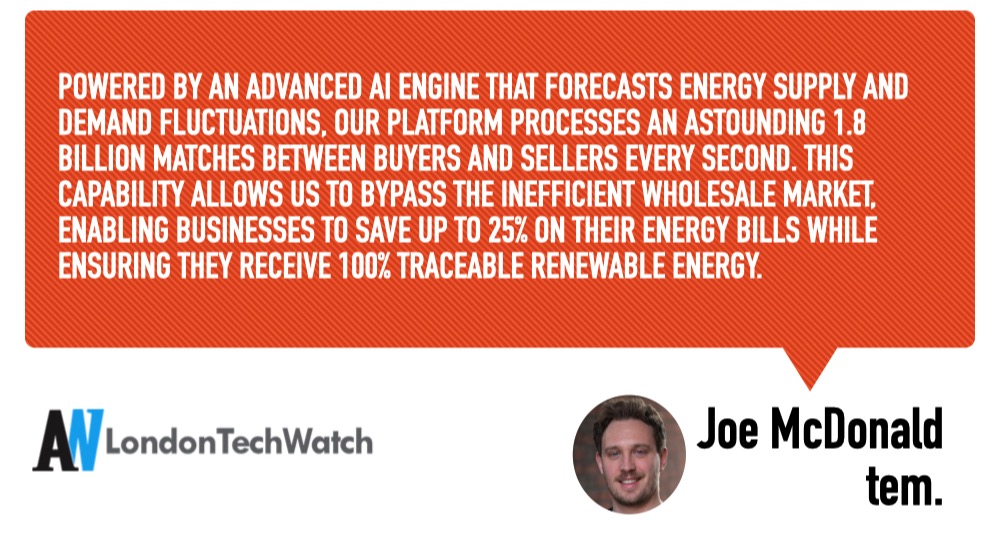The renewable energy sector presents a compelling opportunity for smaller producers. Technological advancements have reduced startup and operational costs, making market entry more feasible. Additionally, large energy conglomerates often overlook small-scale projects such as rooftop solar installations or modest wind farms. For businesses, this landscape offers potential cost savings by bypassing traditional supplier-provided energy, which is typically sold at a large markup on the wholesale market. tem. has developed a platform to capitalize on this opportunity, enabling renewable energy generators to sell their capacity directly to businesses through an automated and scalable system. The platform employs sophisticated matching algorithms to optimize transactions, reducing costs while providing unprecedented traceability. While large corporations have long had the ability to purchase energy directly from generators, tem.’s mission is to extend this option to businesses of all sizes. Participants in the automated marketplace can expect significant benefits. Purchasers may realize an average savings of 25% on their energy costs. Generators also stand to gain from improved pricing, as they are no longer subject to the constraints of wholesale markets dominated by larger players.
London TechWatch caught up with tem. CEO and Cofounder Joe McDonald to learn more about the business, the company’s strategic plans, latest round of funding, and much, much more…
Who were your investors and how much did you raise?
We raised £10.5M in our Series A funding, bringing our total funding to £13M. The round was led by Atomico, a European venture capital firm, with additional support from our existing investors AlbionVC and Revent.
We were also joined by some incredible angels, including Holly and Sam Branson, Wise’s CTO Harsh Sinha and CPO Nilan Peiris. Notably, the round also saw participation from the President of Monster Energy, and leading Fintech investor Christian Deger, among others. This investment will play a crucial role in accelerating our mission to reshape the UK’s energy landscape.
Tell us about your product or service.
I cofounded tem. in 2021 alongside three cofounders from Limejump – Jason Stocks, Bartlomiej Szostek, and Ross Mackay. We saw firsthand how inefficient and costly it was to transact through the wholesale energy market.
With a mission to democratise renewable energy and accelerate the clean energy transition, we developed a platform that uses a unique matching algorithm to make energy transactions more affordable, smarter, and 100% traceable for both business owners and renewable generators across the UK.
What inspired the start of tem.?
 The inspiration behind tem. came from the inefficiencies I saw in the energy market’s transaction processes. After spending nearly a decade building and selling a renewable tech company, I wanted to go deeper and rethink the entire transaction flow, rather than just making surface-level improvements. The energy market still operates in a way that limits real change.
The inspiration behind tem. came from the inefficiencies I saw in the energy market’s transaction processes. After spending nearly a decade building and selling a renewable tech company, I wanted to go deeper and rethink the entire transaction flow, rather than just making surface-level improvements. The energy market still operates in a way that limits real change.
I realised that the real issue lay not in creating another enterprise SaaS or energy management tool, but in fundamentally transforming how transactions are handled. That’s why we launched tem. in 2021, with the mission to democratise renewable energy and accelerate the clean energy transition. Our platform now uses a cutting-edge matching algorithm to make energy transactions smarter, more affordable, and 100% traceable for all users – business owners and renewable energy generators alike.
What truly motivates us is the belief that our solution works for everyone, not just a privileged few. We prioritise the needs of system users over middlemen, ensuring that the benefits of renewable energy are accessible and equitable for all. It’s crucial to recognize that 99% of businesses lack the resources to purchase energy directly from generators like Apple or Patagonia do. Our aim is to bridge that gap, making renewable energy attainable for every business, regardless of size.
How is it different?
Small and medium-sized businesses are critical to tackling climate change, and they’ve been hit hard by the recent energy crisis, with bills soaring by 124%. We built tem. to ensure that any UK business can access affordable energy, thereby benefiting from cost savings while contributing to the clean energy transition right from their doorstep.
Traditional wholesale markets require buyers and sellers to navigate through up to seven different intermediaries, leading to inefficiencies, high fees, and a lack of traceability regarding where their money goes.
At tem., we are transforming the energy market with our proprietary algorithm that connects businesses with renewable energy generators in real-time. Our platform removes traditional barriers by creating a single, streamlined system that facilitates direct transactions between buyers and sellers for the first time.
Powered by an advanced AI engine that forecasts energy supply and demand fluctuations, our platform processes an astounding 1.8 billion matches between buyers and sellers every second. This capability allows us to bypass the inefficient wholesale market, enabling businesses to save up to 25% on their energy bills while ensuring they receive 100% traceable renewable energy.
Additionally, the technology to facilitate such a direct matching system simply wasn’t possible to scale three years ago. Our innovative approach positions tem. at the forefront of the energy market transformation.
What market are you targeting and how big is it?
tem. serves two key markets: renewable energy generators and businesses looking for cleaner energy solutions. There are 2.4 million businesses in the UK that can be matched with over 22,000 onshore renewable generators, from large-scale wind farms to family-owned solar parks. Our matching engine thrives on this diversity, serving businesses of all sizes.
However, up until now, only mega-corporations capable of negotiating complex Power Purchase Agreements (PPAs) have benefited from transacting directly with renewable generators. 99% of UK businesses are still forced to buy energy through the opaque, inefficient, and volatile wholesale market that has remained largely unchanged since the 1980s.
This system means that UK companies are paying 25% more than they should for renewable energy and allows market middlemen to capture £1.65 billion annually in transaction fees. A recent analysis by tem. reveals that British businesses are losing an astonishing £2.6 billion each year in hidden energy transaction fees. What’s more, this means they have little transparency or control over their energy supply.
At tem., we are dedicated to changing this by providing transparency and control over energy supply for the 99% who have been left behind.
What’s your business model?
tem. operates as the first neo-utility, providing an end-to-end solution for renewable energy transactions. We create and manage transactions between businesses and renewable energy generators, facilitating payments within our unique economy system. We offer all the standard utility services – such as invoicing, insights, and reporting – but with a supercharged user experience that includes validation down to a half-hourly basis, showing the exact origin of the energy bought or sold.
Our business model is built around a single platform transaction fee, with the majority of the transaction benefits returned to our buyers and sellers. This approach allows both parties to achieve significantly improved prices compared to the traditional wholesale market. By eliminating unnecessary intermediaries, we ensure transparency, efficiency, and better value for everyone involved.
How are you preparing for a potential economic slowdown?
Energy is a resilient sector, as it remains essential regardless of economic conditions – people need to power their businesses, and renewable resources like wind, sun, and rain are unnoticed by economic cycles.
For us, the focus is on solving pain points for our customers during challenging times. We were born in a downturn, so sustainable growth and an intense focus on customer experience are ingrained in our DNA. It’s no surprise that economic slowdowns often produce the strongest companies in venture capital portfolios, and we’re determined to be one of them.
Our platform is also insulated from the market volatility that has troubled traditional energy companies. By perfectly matching buyers and sellers, we effectively cap and collar risk, providing stability and predictability in an unpredictable world. This unique approach, combined with strong investor support – similar to the early days of fintech disruption – allowed us to successfully close our funding round despite one of the toughest fundraising climates in a decade.
For us, it’s less about weathering the slowdown and more about helping our customers do the same.
What was the funding process like?
After three years of development and testing with our founding customers, we launched our platform in January and have experienced fantastic adoption and growth since then. We’re focused on capturing a substantial share of the UK wholesale market while elevating the customer experience that’s been lacking in the sector. The commitment from our investors reflects their confidence in our ability to reshape the energy landscape and build lasting trust with millions of businesses. This funding round is a testament to our sustainable growth and scalability, ensuring we’re ready for expansion when the time is right, all while keeping customer satisfaction at the forefront. With the UK market being five years ahead of many others, establishing a strong foothold here sets us up for success in emerging, fragmented energy markets globally.
What are the biggest challenges that you faced while raising capital?
We have been lucky not to face many challenges while raising capital. We typically look to raise money when we don’t need it urgently, which means balancing the lower priority of investment against our primary focus of building great things. From my experience, running a successful round with minimal impact on the business requires going all-in on funding discussions for a set period. Fortunately, having four founders means the business keeps moving forward, allowing me to manage a tight, invite-only process with the best-fit investors from our current VCs. Remarkably, we actually grew during this fundraising period, which helped mitigate any perceived risks from investors.
We have been lucky not to face many challenges while raising capital. We typically look to raise money when we don’t need it urgently, which means balancing the lower priority of investment against our primary focus of building great things. From my experience, running a successful round with minimal impact on the business requires going all-in on funding discussions for a set period. Fortunately, having four founders means the business keeps moving forward, allowing me to manage a tight, invite-only process with the best-fit investors from our current VCs. Remarkably, we actually grew during this fundraising period, which helped mitigate any perceived risks from investors.
The biggest challenge, however, is picking the right partner. I used to think all money was equal and that I should just take the best terms, but this time around, it’s really about the partnership and relationship with the person who will join our board and be part of our journey for the next 10 years. Figuring out value alignment and building trust in a short time frame can be a real challenge.
What factors about your business led your investors to write the cheque?
Our investors recognised that tem. has the potential to solve a massive, global problem, creating a generational business similar to PayPal, Stripe, or Amazon. This isn’t about tinkering around the edges of the energy market; it’s about fundamentally transforming it. With $1 trillion in direct renewable energy transactions to unlock globally, the opportunity for outlier returns is significant. Atomico, which believes that Europe can produce the next trillion-dollar generational companies, saw a perfect alignment between our vision and theirs.
As Terese Hougaard, our partner at Atomico, mentioned, tem. has not only achieved impressive growth to date but also holds massive future potential. We’re leveraging the deep energy expertise we gained from Limejump and Shell, uniquely positioning us to seize this opportunity.
What are the milestones you plan to achieve in the next six months?
Currently, we’re collaborating with hundreds of businesses and generators across the UK. In the near term, our focus is on significant growth within the UK market and building trust in our new business model. One of our biggest learnings so far is that many potential customers find our offering “too good to be true.” Given the long-standing lack of trust in traditional utilities – some of which they’ve relied on for over 20 years – combined with past experiences of failed energy startups, this scepticism is understandable.
To combat this, we aim to raise awareness about how our unique benefits are unlocked through our innovative business model, supported by a highly sophisticated platform. Clearly communicating this in a concise manner is crucial but challenging.
What advice can you offer companies in London that do not have a fresh injection of capital in the bank?
The advice is highly dependent on each company’s market and situation. Many investors and businesses are still dealing with the fallout from the inflated valuations seen between 2020 and 2022, which have proven challenging to grow into. From our experience, there are countless factors you can’t control, including the investment landscape. However, there are two critical aspects you can manage: your product experience and your burn rate.
Focus on your customers and build something exceptional for them. Cut any unnecessary spending and leave your ego at the door – this should be a default mindset for mission-driven companies. Remember, the best time to raise money is when you don’t need it. Concentrate on providing traction and demonstrating your value.
It’s important to note that we may be returning to pre-2019 investment levels, and we could be on the brink of another golden era, thanks to the disruptive potential of AI. It’s becoming increasingly feasible for companies to raise less capital early on while accomplishing much more. Our internal philosophy sums it up well: obsess over our customers and don’t be greedy.
Ultimately, think about why you are uniquely positioned to solve problems, apply effectual thinking, validate your ideas early, and be flexible enough to pivot. Remember that the journey is what counts; the results will come, and they may not feel as significant as you expect.
Where do you see the company going in the near term?
At tem., we’re reshaping the future of energy by advocating for a transparent and accessible approach to renewable energy delivery. Our mission is to build a system where businesses can access affordable, 100% traceable energy seamlessly.
Over the next five years, we are committed to unlocking even more opportunities for businesses worldwide to access reliable and sustainable energy solutions while fostering the trust that is essential for our success.
What’s your favourite outdoor activity in London?
I always make time for my morning walk with my dog through Hampstead Heath. There’s something calming about wandering beneath trees that have stood for over a century, witnessing countless entrepreneurs rise and fall. It’s the perfect way to clear my mind before diving into the day.





